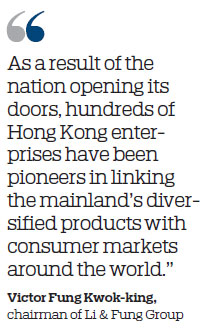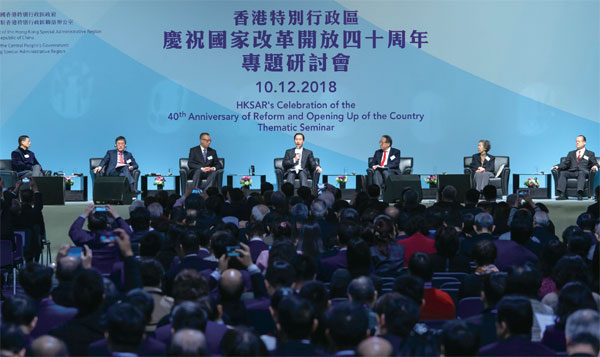Business leaders hail opening-up a 'win-win' for mainland, SAR
Updated: 2018-12-11 07:28
By Sun Feier in Hong Kong(HK Edition)
|
|||||||||
Prominent business leaders on Monday hailed the Hong Kong Special Administrative Region's role in linking the Chinese mainland with the global market as a continuation of the nation's reform and opening-up.
Victor Fung Kwok-king, chairman of supply chain management group Li & Fung, described the past four decades since the country threw open its doors as a period of Hong Kong "contributing to the nation and obtaining self-achievement", which has helped both the city and the mainland achieve development and prosperity.
As an eminent business leader at the helm of a 112-year-old conglomerate supplying clothes and products to global retailers, Fung recalled the SAR's role in the past 40 years from the perspective of trade at a themed seminar as part of the celebrations marking the 40th anniversary of the country's reform and opening-up.
|
Panelists share their insights from an array of perspectives, including trade, finance, the private sector, etc, during Monday's Thematic Seminar on the HKSAR's Celebration of 40th Anniversary of Reform and Opening Up of the Country at the Hong Kong Convention and Exhibition Centre. |
He said that as a result of the nation opening its doors, hundreds of Hong Kong enterprises have been pioneers in linking the mainland's diversified products with consumer markets around the world.
The trading industry - one of Hong Kong's pillar industries - is weaving a supply chain network in manufacturing, collection and distributing centers, as well as consumer markets. That gives the city an edge as the "super connector" in helping facilitate "Made in China" goods going global.
"What Hong Kong has achieved in the past four decades is far more than that - the trading industry is just an epitome," Fung said.
The financial sector is another that reflects the nation's reform and opening-up process, Fung noted. In 1978, mainland-based enterprises began investing in the Hong Kong market. It was followed by the creation of the first red-chip stock Conic Investment in 1984 and the listing of the first H-share company Tsingtao Beer on the Hong Kong Stock Exchange in 1993. These have made the city a preferred destination for mainland enterprises seeking fundraising overseas.
Annie Wu Suk-ching, who founded the mainland's first joint venture, Beijing Air Catering, shared her story about the launch of the "Joint Venture 001".
"No one had ever expected we could make it. Both sides treated each other heart-to-heart and shared the weal and woe of the motherland. It was our shared ancestral and cultural roots that had fostered mutual trust, sincerity and patience in the months-long negotiations," Wu told China Daily in September.

Neil Shen Nanpeng - co-founder of Sequoia Capital China, who worked as an investment banker in Hong Kong 24 years ago - highlighted the impact of mainland capital on ensuring the city's status as a financial hub in Asia.
Today, as a driver behind the private Chinese economy, he has witnessed scores of success stories in the private sector. "Our policy construction, entrepreneurs' creativeness, demographic bonus, as well as the 'engineer bonus', are the four key factors in our success."
Fung pointed out that as the new era dawned, new trends have emerged in the world economy. One trend is that globalization has changed from production-oriented to consumption-oriented since 2010, given the rise of emerging middle classes, especially in developing countries.
With the reshuffling of the international system, he said, China is playing a much more significant role by launching the Asian Infrastructure Investment Bank, the Belt and Road Initiative and many other constructive projects.
He said that as reform and opening-up revs up, Hong Kong is looking to redefine its role in serving the mainland and developing itself. While helping mainland enterprises to go global, Hong Kong companies stand to benefit by either setting its footprint together with mainland companies or serving as a supply chain manager and coordinator.
Jonathan Choi Koon-shum, chairman of Hong Kong-based Chinese General Chamber of Commerce, said the city is set to continue its role as "connector, investor and operator" to better seek the opportunities offered by the BRI, the Guangdong-Hong Kong-Macao Greater Bay Area and renminbi globalization.
joycesun@chinadailyhk.com
(HK Edition 12/11/2018 page4)
